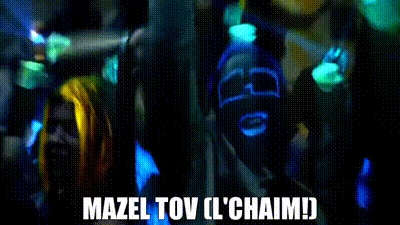
Jewish sayings have been used for thousands of years and have evolved to take on unique sayings that have found their way into every day use. Here’s a look at a few more unique Jewish sayings.
Baruch Hashem
.@CoryBooker: "Thank God, baruch haShem, that we're doing multilingual tonight." https://t.co/qr6gtrNAcp #DemDebate pic.twitter.com/z1xsF22WNw
— Evan McMurry (@evanmcmurry) September 13, 2019
Baruch Hashem, Hebrew for “thank God,” is a common response by religious Jews to “how are you doing?” But it means much more than that, in fact baruch Hashem can be a boilerplate response in a variety of situations.
“How’s the new job?”
“Baruch Hashem.“
“How’s the family?”
“Baruch Hashem.”
Basically anywhere you can express gratitude or thanks for a good situation baruch Hashem can be used. The first recorded utterance of this now famous saying is by Noah in the Bible, who after the flood said: “Blessed is the Lord God of Shem.”
וַיֹּ֕אמֶר בָּר֥וּךְ יְהֹוָ֖ה אֱלֹ֣הֵי שֵׁ֑ם וִיהִ֥י כְנַ֖עַן עֶ֥בֶד לָֽמוֹ׃
Genesis 9:26
And he said,
Blessed be יהוה,
The God of Shem;
Let Canaan be a slave to them.
Yasher Koach
Yasher koach is the Jewish way of saying “good job and congratulations!”
Got that new job?
“Yasher koach!”
Got into university?
“Yasher koach!”
In certain Orthodox circles yasher koach is also used as a way of saying thank you after someone gives a talk. The phrase also can be used in situations where you’d say to a person “more power to you.”
Yasher koach comes from the Talmud (Shabbat 87a) in the comments by Jewish sage Resh Lakish on why Moses broke the stone tablets containing the Ten Commandments after seeing the Golden Calf.
In his commentary Lakish used the Hebrew phrase “yishar koach,” which means “may your strength (koach) be straightened (yishar).” The direct quote is: “Yishar kochecha sheshibarta” which translates as “all strength to you for breaking them.”
Shkoyach
Shkoyach is a Yiddish word that expresses thanks, appreciation and congratulations. In fact, you can use the phrase in any situation “yasher koach” is appropriate.
Finished that impressive presentation you’ve been working on for weeks?
“Shkoyach!“
Did a personal best at your last 5k?
“Shkoyach!“
Said something impressive in your d’var Torah?
“Shkoyach!“
Shkoyach is also said in Ashkenazi synagogues after someone receives an honor during a service (i.e. called up for an aliyah, etc…)
The word shkoyach is Yiddish in origin but it comes from the Hebrew phrase “yasher Koach.” If you notice, shkoyach is the same phrase just missing the “ya” beginning.
Mazel tov

Mazel tov is Hebrew/Yiddish for congratulations for a significant event.
Got engaged?
“Mazel tov!“
Had a baby?
“Mazel tov!“
It’s your birthday?
“Mazel tov!“
The phrase comes from Talmudic Hebrew and literally translates as “good star” with mazzāl meaning “constellation” or “destiny.” The Yiddish language adopted the phrase where it took on the definition of having good luck or fortune.
L’chaim
L’chaim is Hebrew for “to life” and it is used today as a way of toasting something.
“Here’s to the happy couple!”
“L’chaim!“
“Next year in Jerusalem!”
“L’chaim!“
You can also have a “l’chaim,” usually a celebratory drink, in honor of a happy occasion.
“Join me in having a l’chaim in honor of my son’s bar mitzvah.”
The origins of the custom to toast this way can be traced to an account in the Talmud where Rabbi Akiva said after pouring cups of wine at a banquet a benediction of “Wine and life to the mouth of the sages, wine and life to the mouth of the sages and their students.”
Bli Neder
Literally meaning “without vow” in Hebrew, bli neder is used as a way of promising to do something without making a formal commitment (basically it’s a get out of jail card for promising to do something).
“So I’ll see you next week?”
“Bli neder.”
“You’ll be ready to go in an hour?”
“Bli neder.”
“You’ll do this for me?”
“Bli neder.”
The tradition to say bli neder comes from the Torah commandment:
אִישׁ֩ כִּֽי־יִדֹּ֨ר נֶ֜דֶר לַֽיהֹוָ֗ה אֽוֹ־הִשָּׁ֤בַע שְׁבֻעָה֙ לֶאְסֹ֤ר אִסָּר֙ עַל־נַפְשׁ֔וֹ לֹ֥א יַחֵ֖ל דְּבָר֑וֹ כְּכׇל־הַיֹּצֵ֥א מִפִּ֖יו יַעֲשֶֽׂה׃
If a householder makes a vow to יהוה or takes an oath imposing an obligation on himself, he shall not break his pledge; he must carry out all that has crossed his lips.
Numbers 30:3
Boiled down, if you say you are going to do it, you have to do it– so hedge your bets and say bli neder instead.
Originally Published Jun 22, 2022 07:07AM EDT
